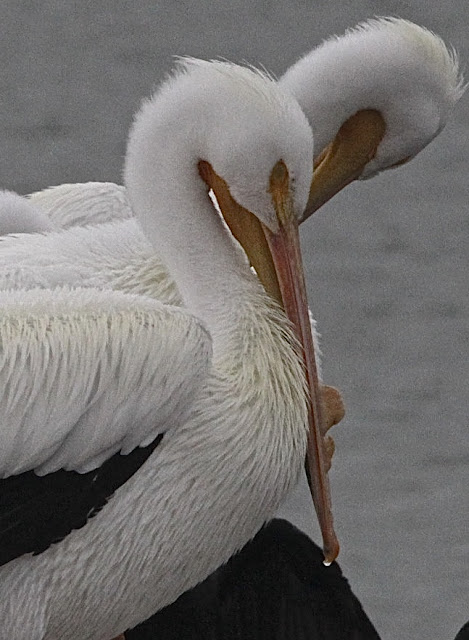This week in birds - #543
A roundup of the week's news of birds and the environment:
White Pelicans enjoying a rest by Galveston Bay.*~*~*~*
The Gulf of Mexico is abnormally warm which could mean a very active tornado season.
*~*~*~*
Freshwater biodiversity does not always get the respect it deserves in discussions about conservation but we rely on it for many essentials.
*~*~*~*
The Convention on International Trade in Endangered Species of Wild Fauna and Flora (CITES) is considering sanctions on Mexico for failing to provide sufficient protection for the vaquita marina, a small porpoise that is the world's most endangered marine mammal.
*~*~*~*
DDT has been found in high concentrations on the ocean floor along the California seacoast that once served as a dumping ground for the material.
*~*~*~*
Former governor of California Jerry Brown can now rest on his laurels; a beetle has been named for him!
*~*~*~*
Do you suffer from a brown thumb as a gardener? Never fear; here are some plants that even you can't kill!
*~*~*~*
*~*~*~*
The wild salmon population along the West Coast has plummeted resulting in a ban on fishing for the species.
*~*~*~*
There was an unusual parade of five planets - Jupiter, Mercury, Venus, Uranus, and Mars - available for viewing in the western sky this week.
*~*~*~*
Bats can't seem to catch a break. They are threatened everywhere, but there is one surprising threat to the species: hunting.
*~*~*~*
This can't be good. A study has found that thousands of pounds of PFAS "forever chemicals" have been injected into gas and oil wells in Texas.
*~*~*~*
Tiny ponds play an outsized role in promoting and maintaining biodiversity.
*~*~*~*
Here is a collection of photos of the birds of Southeast Arizona.
*~*~*~*
Fracking is a threat to the Allegheny Plateau and its biodiversity. Here is why it is so important to protect this place.
*~*~*~*
Here's a bit of good news: For the first time production of U.S. electricity from renewables has surpassed the production from coal.
*~*~*~*
One way to fight global warming is to save and protect wild animals who are our allies in helping to sequester carbon.
*~*~*~*
A 10-year-old girl with a sand bucket helped to save the life of a giant octopus that was stranded on a mud flat. Could his name have been Marcellus?



Good morning, Dorothy. Thank you for the weekly roundup. Even though I know it's true I still shake my head that we used the ocean as a dumping ground for DDT. As for Jerry Brown having a beetle named after him, that's better than an Oscar in my book. Good for Jerry. Maybe he'll have a family coat of arms designed incorporating the beetle, or in this day and age maybe a tattoo. Best wishes - David
ReplyDeleteI think a family coat of arms with a beetle on it is something that Jerry Brown might just do!
DeleteAs always, thank you, Dorothy, for keeping us informed!
ReplyDeleteThank you so much for that link to the southeastern Arizona birding photos; it brought back many lovely memories, and I had to smile at the author's reaction to verdins, several of which call my property home.
ReplyDeleteDid you know that there's another book out featuring a giant Pacific octopus? Gina Chung's Sea Change. I'm keeping my eye on it, but I have to admit that I'm a bit leery of reading it. How could it possibly hold a candle to Remarkably Bright Creatures?
I had just last week seen something about Chung's book and I have to admit my reaction was much the same as yours. "Remarkably Bright Creatures" is the first five-star read I had had in a very long time!
DeleteLucky you with your Verdins. Lovely little birds.
The list of plants that even I can't kill is very helpful. I'm on the lookout for a few of these.
ReplyDeleteIt's horrible to imagine what those "forever chemicals" are doing to the world. Sigh.